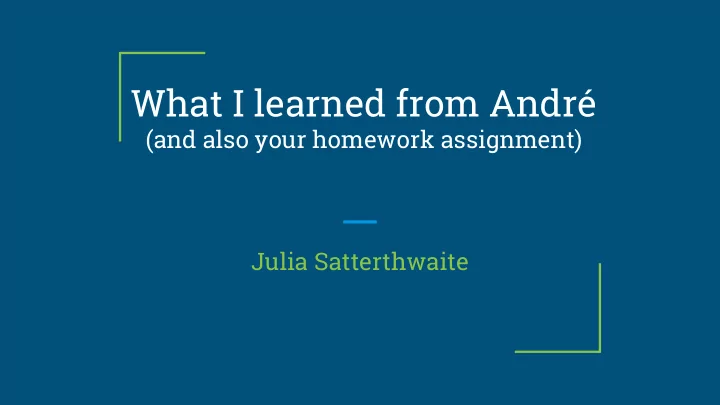

What I learned from André (and also your homework assignment) Julia Satterthwaite
1. How to be a successful model
2. How to make drinking Starbucks and watching The Walking Dead into a religion
3. How he gets pulled over for D.W.B.
4. How to be a superstar teacher
5. How sometimes you just have to chill
That’s it! He rocks. Just kidding ...
Classroom management issues
Observing André for classroom management -develop a rapport -establish clear expectations -be personable -be present
Instructional Rounds Premise People learn best about the meaning of high quality instruction by observing other teachers, students, and the work students are asked to do, followed by meaningful conversation and analysis.
WHAT?! ME?!
Yes, you! 1. identify interested teacher volunteers through Google form 2. list these teachers/hours in the Staff Weekly Communication 3. spend all or part of ONE of your conference hours observing by Dec. 3 4. record what you observed as it pertains to Expectations/Environment 5. send a follow-up thank you to the host teacher 6. bring back data (notes) to our Dec. 3 after school PD session
Instructional Rounds Procedure Courtesy of Gary Abud, Education Presenter and Teacher at Grosse Pointe Schools
Observing for Expectations (37) -operate as “belief sets” or “action theories” that influence our own efforts in relation to the achievement of desired goals and outcomes -expectations act as an internal compass -this use of the word EXPECTATIONS is NOT the explicit expression of standards used to direct and inform the behavior of others -this use of the word EXPECTATIONS IS for our students, ourselves, and the learning process itself that form the foundation for the culture of the group
Observing for Environment (227) -the physical environment is the “body language” of an organization, conveying its values and key messages even in the absence of its inhabitants -it will influence how individuals interact, their behaviors, and their performance -it can inhibit or inspire the work of the group and the individual -good news -- even if one’s classroom layout/furniture/etc. sucks, there’s still stuff the teacher can do to facilitate and promote a culture of thinking
Instructional Rounds Norms -be inconspicuous when entering/exiting -don’t participate in the class; just observe -focus on the teaching/learning and NOT the teacher -you’re observing for Expectations and Environment only -take notes after your observation so you can be attentive
Adapted from Bellingham Public Schools Bellingham, WA
Start End 1:13 5:23
Debrief -what did you notice? -how are we feeling? -what do you hope to get out of this? -what fears do you have?
Instructional Rounds Next Steps 1. identify interested teacher volunteers through Google form 2. list these teachers/hours in the Staff Weekly Communication 3. spend all or part of ONE of your conference hours observing by Dec. 3 4. record what you observed as it pertains to Expectations/Environment 5. send a follow-up thank you to the host teacher 6. bring back data (notes) to our Dec. 3 after school PD session
Thank you
Recommend
More recommend